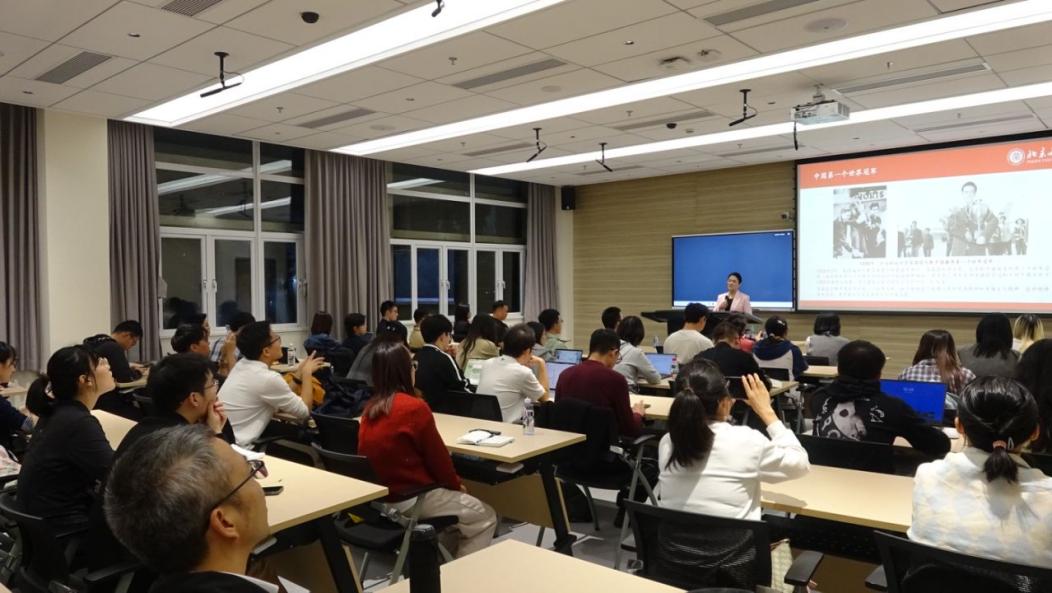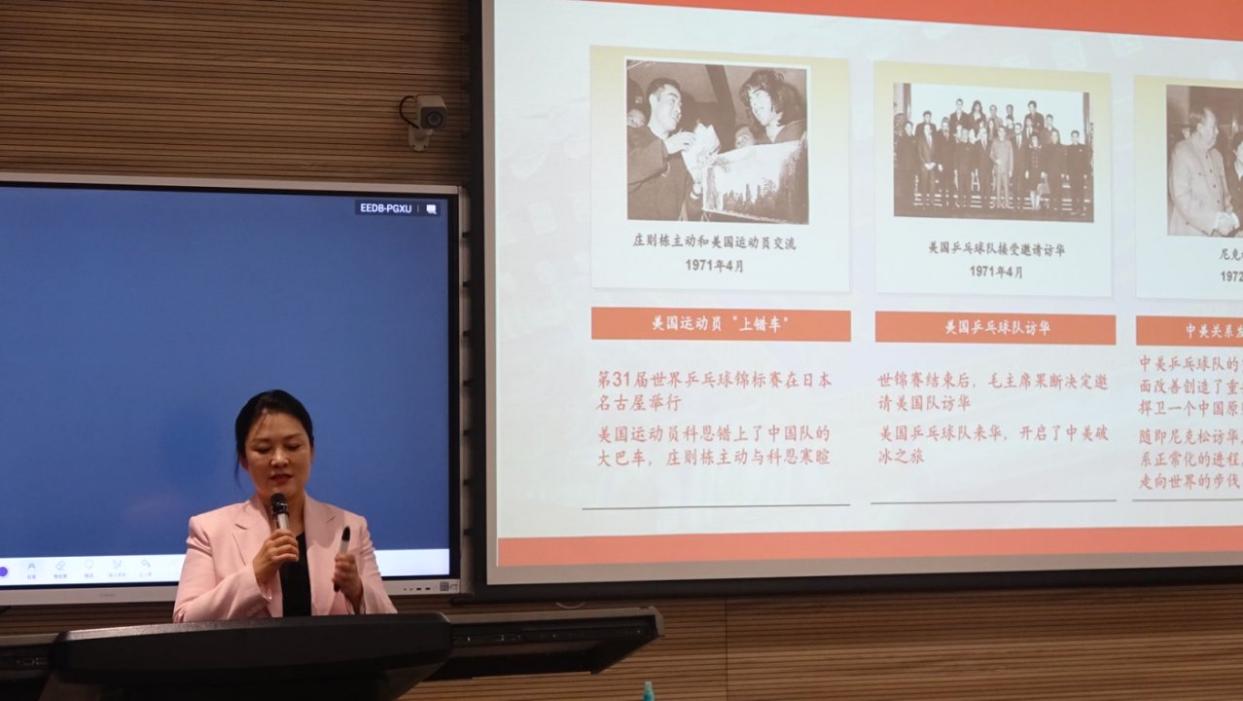On the evening of October 23, 2025, the eighth lecture of this year’s “Science & Humanities: An Interdisciplinary Journey” series was held as scheduled at the PKU Shenzhen Graduate School. The event featured Professor Liu Wei, a PhD, former world champion in table tennis, and current professor at Peking University, who delivered a talk titled “From the Table to the Podium: Champion Spirit in Fulfilling the Mission of Sports Education.” The lecture attracted a large number of students, faculty, and alumni, filling the venue to capacity.

Lecture Scene
Liu Wei is not only a table tennis legend from the 1990s with multiple world titles but also completed her undergraduate to doctoral studies at Peking University after retiring from the sport. She initiated the “Champions Lecture” series, creating a new model in Beijing’s higher education that integrates ideological education with sports. Her MOOC, “Liu Wei Teaches Table Tennis,” has been recognized by the Ministry of Education as a national first-class undergraduate course. Her multifaceted roles heightened the audience’s anticipation.
During the lecture, Liu Wei first traced the history of table tennis. Originating from indoor tennis among British aristocracy, the sport initially featured long-handled rackets that were difficult to use. Through reforms, it evolved into its current form, characterized by the distinct red and black rubber surfaces. The International Table Tennis Federation (ITTF) logo, she noted, serves as the “entry pass” for competition equipment.
When discussing the development of China’s national table tennis team, Liu Wei emphasized its unwavering adherence to the One-China principle. Since formally participating in international competitions in 1952, this stance has been the team’s fundamental guideline. The journey of Chinese table tennis glory began from there: in 1959, Rong Guotuan won the world championship at the World Table Tennis Championships, securing not only China’s first world title in sports but also greatly uplifting national morale in the early years of the People’s Republic. Coinciding with the 10th anniversary of the PRC’s founding, Premier Zhou Enlai was deeply inspired by this dual celebration of “national glory” and “decade milestone,” personally naming the newly established table tennis equipment factory “Double Happiness.” Today, top players like Ma Long and Fan Zhendong continue to use rackets and rubbers from this manufacturer, which carries forward the legacy of Chinese table tennis, ensuring the continuation of excellence and heritage.

Liu Wei delivers her lecture
The story of 1971's "ping-pong diplomacy" moved the audience. Liu Wei recalled that, guided by Premier Zhou's principle of "friendship first, competition second", the Chinese team travelled to Nagoya, Japan. There, player Zhuang Zedong's chance interaction with American Glenn Cowan became the first crack in the ice between China and the United States, eventually paving the way for Nixon's visit and the normalisation of Sino-Japanese relations—the legend of "the small ball moves the big ball" felt alive once more.
Turning to her own career, Liu offered an inspiring narrative. At five she began playing beside the family dinner table; at eight, a China Sports Daily headline announcing "China sweeps all seven world titles" planted the quiet vow that she would become a champion. At 14, three straight national junior titles earned her a place in the national squad, but a tough European tour followed. When Hong Kong offered her a contract, she remembered the Shandong sports commission chief's words—"I refuse to believe Shandong cannot produce a world champion"—and stayed.
During the 1991 World Championships, after China's men's and women's teams had faltered, she and Wang Tao seized the mixed-doubles crown, launching a run of three titles in six years. She distilled Chinese table tennis spirit as: "Where rivals lack, we possess; where they possess, we excel; where they excel, we refine; where they refine, we innovate," and told students that the pinnacle of teamwork is "understanding without a word."
Since transitioning into education, Liu Wei has achieved remarkable success at Peking University . After joining the faculty in 2003, she played a key role in relocating the table tennis venue for the 2008 Olympics to PKU—transforming the originally assigned taekwondo venue into what is now known as the Qiu Deba Stadium. This site later witnessed the Chinese table tennis team sweeping all gold, silver, and bronze medals in the men’s and women’s singles at the Beijing Games.
In her teaching, Liu introduced table tennis courses for non-sporting majors, using a “fast-track learning” approach to spark interest. After taking over the university team, she applied advanced Chinese training methodologies, leading students to nearly 100 gold medals in competitions. She also pioneered a seamless training system connecting the PKU-affiliated primary school, middle school, and university—bringing the vision of “sports-education integration” to life.
During the Q&A session, students eagerly posed questions. A member of the PKU Shenzhen Graduate School table tennis team asked about training with the main campus team—to which Liu promptly invited them to summer sessions at PKU, even offering free access to her online course resources. Another student inquired about “balancing the desire to win with mental composure during matches.” Liu shared shooting champion Tao Lu’an’s philosophy: “Focus on the process, not the outcome,” advising students to concentrate on each point. When asked how to break through a performance plateau, she reflected softly on her four years as a reserve player, emphasizing that “belief” is key—and that persistence for a collective goal can help overcome such challenges.
Liu Wei’s sharing not only conveyed the intricacies of table tennis but also vividly embodied the sporting spirit of “never give up, never fear failure, and never accept defeat,” as well as a life attitude of “staying grounded through highs and lows.” This resonates deeply with the interdisciplinary vision of the “Science & Humanities” series. The lecture programme will continue to invite distinguished scholars and guests to explore cutting-edge ideas at the nexus of technology and the humanities, inspiring audiences with the sparks of cross-disciplinary dialogue.